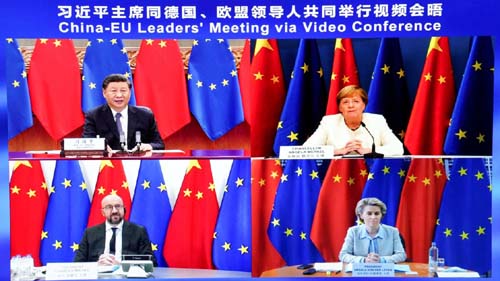
China-EU economic ties on brink of an ideological confrontation trap
Ding Gang
A big challenge facing China and the EU is that bilateral economic and trade relations have come to the brink of an ideological confrontation trap. Unless the two sides make joint efforts, meet each other halfway, show enough courage and carry out concrete actions to stabilize bilateral economic and trade ties, especially in terms of making progress on the resolution of investment, market and supply chain issues between the two, there is a risk of intensifying “decoupling.”
Since “decoupling” was triggered by the US-launched trade war with China in 2018, conflicts in China-EU economic and trade ties caused by differing ideologies have continued to increase.
In recent years, Washington has focused on forming a “value alliance” against China, with particular emphasis on containing China in the fields of information technology and emerging technologies.
In terms of ideology, the EU is aligned with the US as a natural ally. Some EU member states tend to cooperate with Washington more closely, be it proactively or passively. For example, they have drawn a clear-cut line between themselves and Chinese tech giant Huawei’s 5G technology due to so-called differences in security and political systems. The EU has also extended its arms trade embargos against China, citing political issues, to include high-tech sectors.
Some EU politicians continued to pile up pressure on European companies by hyping up issues such as human rights in Xinjiang. As a result, the mistrust between China and the EU has continued to rise. China is increasingly concerned that the EU will mix human rights, Hong Kong and Xinjiang affairs with economic and trade issues. Europe, on the other hand, is very worried about that China will take retaliatory moves against its companies. In addition, the adjustment of China’s domestic economic policy and the “broken chain” effects during the COVID-19 pandemic also increased concerns about future uncertainties.
Germany’s new government signed a coalition agreement in December 2021. The current administration now stresses on reducing strategic dependence in its China policy.
With the continuation of the Russia-Ukraine conflict, EU companies will have to reconsider their future investments in China, their market expansion, the prospect of industrial chain dependence, and look for alternative places for their production against the backdrop of intensified ideological confrontation. Chinese companies and exporters will also have to consider the impact of this trend on their development in Europe.
A “decoupling” situation, if it happens, in China-EU economic and trade relations, will be detrimental to both sides. Take employment, the interdependence between the two is obvious to see.
In April, the European Think-Tank Network on China published its eighth research report on Europe’s economic dependence on China. Two sets of data in the report are telling. A total of 900,000 jobs in Germany are in one way or another related to business with China, accounting for 2 percent of the German workforce, while German companies directly employ more than 1 million staff in China, jobs created by their Chinese suppliers and partners not included. China-Germany interdependence reflects the degree of China-Europe interdependence.
That being said, China and the EU need to view their economic and trade issues with a broader attitude, and to minimize the impact of ideological conflicts on the development of their economic and trade relations.
The Russia-Ukraine conflict in Europe has cemented the foundations of the EU’s value alliance. But Europe must not think that such a banner of values can better help its own enterprises and capital to enter the vast Asian market, including China. Considering that European countries have a colonial past in Asia, Europe’s ideology promotion needs to be more restrained.
In the fields of economy and trade, the interests of Europe and the US are not the same, and they are competitive in many fields. If the US-led value alliance dominates the development of global finance and economy, it will be difficult for the EU to truly become a powerful pole in the world. Of course, in that case, China’s development will also face more difficulties.
China needs to put more emphasis on opposing hegemony and war, and maintaining world peace based on UN principles. The most important thing is to start the approval process of the Comprehensive Agreement on Investment as soon as possible through coordinated negotiations. At the same time, it is necessary to explore the possible ways to expand cooperation in non-sensitive technical fields, and to promote technology trade and market access of both sides through continuous bargaining as much as possible.
The Chinese side should coordinate with European companies to deal with the business issues that European companies are most concerned about in an earnest manner. Especially after the initial control of the epidemic, it is necessary for China to solve possible supply chain problems in the future according to EU’s requirements as much as possible, and boost their faith in the Chinese market.
The economic and trade ties between China and the EU have not come easily. The two sides should avoid falling into an ideological confrontation, adopt a pragmatic attitude, and attach more attention to the actual benefits achieved through cooperation.
The writer is a senior editor with People’s Daily, and currently a senior fellow with the Chongyang Institute for Financial Studies at Renmin University of China
